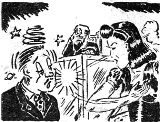|
Army's Point Score
Falls Automatically
To 60 In November
WASHINGTON - The War Department this week stated that reduction of the point score would be dropped to 60 automatically on November 1 and that all Army enlisted men with two years service will be eligible for discharge next March.
The same order confirmed Gen. George C. Marshall's report to Congress that the critical score of 70 was in effect as of October 1 for male enlisted personnel.
Other critical scores as of October 1 include WACs, 36 to be dropped to 34, November 1; male officers, except Medical Department officers, all grades including warrant and flight officers, 75 points.
A later War Department statement authorized release of surplus enlisted men on duty in the U.S. The Army order, applying to all branches, permits commanders to discharge soldiers who are covered by all these conditions:
(1) Not currently eligible for discharge by reason of points or age.
(2) Not qualified for foreign service and have completed two years of service since Sept. 15, 1941.
(3) Surplus to requirements of the force to which they are assigned and "not economically retrainable to perform useful service."
(4) Not possessed of a scarce skill needed by the Army.
It was also stated that this order does not apply to Regular Army enlisted men who enlisted after last August 16, or who have elected to remain in service under other regulations.
The Marine Corps also cut its point score from 70 to 60, effective October 8. The women Marines score
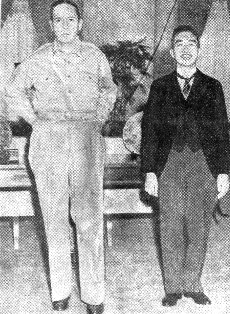 The little character at right, standing at attention in the striped pants and morning coat, is Hirohito,
Emperor of Japan. At left, Gen. Douglas MacArthur stands, hands on hips and towering above the Nip Number One
Man. This picture was taken at the American Embassy in Tokyo when the Emperor recently visited the U.S. military
chieftain and Supreme Commander. This picture was printed in all of Tokyo's three dailies, with a story on the interview. The papers were not allowed to be distributed until MacArthur gave a direct order.
The little character at right, standing at attention in the striped pants and morning coat, is Hirohito,
Emperor of Japan. At left, Gen. Douglas MacArthur stands, hands on hips and towering above the Nip Number One
Man. This picture was taken at the American Embassy in Tokyo when the Emperor recently visited the U.S. military
chieftain and Supreme Commander. This picture was printed in all of Tokyo's three dailies, with a story on the interview. The papers were not allowed to be distributed until MacArthur gave a direct order.
|
The House Military Affairs Committee has appointed sub-committees to visit military centers to discover if discharges are being handled adequately. This action followed complaints of men who claim they have sufficient points for discharge but are not being demobilized. One charge was that men were being forced to cut grass with bayonets to occupy their time.
SHINTOISM IN JAPAN
Supreme Commander Gen. Douglas MacArthur ordered revolutionary political reforms in Japan this week as the U.S. announced it has decided to abolish Shintoism as the State religion of Japan.
The MacArthur order resulted in the resignation of the Japanese Cabinet headed by Prince Higashi-Kuni. Liberal, 73-year-old Baron Shidehara succeeded Higashi-Kuni, with avowed purpose of bringing democracy to feudalistic Nippon. Shidehara formerly was Ambassador to Washington.
The MacArthur demands were far-reaching. They included removal of bars to freedom of speech, religion, and assembly, disbanding the secret "thought" police and release of 3,000 political prisoners by October 10. MacArthur also ordered removal of Home Secretary T. C. Cogamazaki. This move, it was stated by Army News Service, opened the way for Higashi-Kuni to resign, after being hampered in his reform attempts by bureaucrats.
The announcement of the order to Japan to eliminate Shintoism as a state religion came from Washington. The Nippon government was ordered to drop its support for this practice, both in taxation and in schools. Shintoism has been regarded as one of the most powerful controls which Jap military leaders exercised over their people. This new policy was enunciated by the State Department's John Carter Vincent, chief of eastern affairs.
A further drop in the Emperor's perogatives came this week as the resigned Premier announced, after a conference with Hirohito, that his ruler had decided to first submit the name of the next premier to MacArthur for his approval.
The abolition of Shintoism will not affect the religion "insofar as it is a religion of the individual Japanese," the U.S. announcement said.
The new policy toward the Jap state religion was made in a State Department broadcast to the American people.
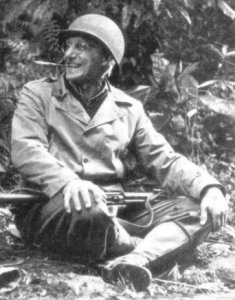 Here's Uncle Joe Stilwell as many remember him when he was commander of U.S. Forces in China, Burma, and India.
Uncle Joe relaxes along a North Burma trail and enjoys a cigarette.
Here's Uncle Joe Stilwell as many remember him when he was commander of U.S. Forces in China, Burma, and India.
Uncle Joe relaxes along a North Burma trail and enjoys a cigarette.
|
Gen. Stilwell Suggests 'Pick-Axe Club'
For Defense Of Valiant Nisei Veterans;
Gives Vivid Definition Of American G.I.
OKINAWA - "You're damned right, those Nisei boys have got a place in the American heart - now and forever."
The skinny old gentleman from carmel, Calif., and Shingbwiyang, Burma, bit fiercely on that battle-scarred cigarette holder of his, sent those piercing glances careening through his G.I. glasses, then banged his desk.
"I say we soldiers ought to form a pick-axe club to protect the Japanese-Americans who fought with us in this war. Yes sir, a pick-axe club. Any time we see any bar-fly commando picking on any of these kids or in any way discriminating against them, we ought to bang them over the head with a pick-axe, and I'm willing to be the charter member of such a club."
Gen. Joseph Warren Stilwell was at his best, talking about a subject close to his heart, but with just enough of a vinegar sound to whet the listener's audient appetite.
"We can't allow a single injustice to be done these Nisei without defeating the very purposes for which we fought this whole war. We may have to give these Nisei veterans aomething special to wear in their lapel, but we must never let them down. These Nisei have bought an awful big chunk of America with their own blood."
CONSTANT ROOTER
"I know that Gen. Mark Clark is very proud of what his Nisei regiment did in Italy, and Gen. Frank Merrill is a constant rooter for those who fought with his Marauders in Northern Burma. I know that they and most of us who saw the Nisei in action won't let them down."
On the subject of his future, Uncle Joe said he was just about ready to hang up that old campaign hat.
"I'll be 65 in two years, you know. Soon I'll be going back to our little house in Carmel and be "Farmer Joe."
When I asked the General about the possibilities of his writing a book, he snapped back, "would that mine enemy write a book."
Stilwell, who is still the easiest general in the Army to talk to, asked a lot of questions about the old theater - about the Engineer outfits still left between Ledo and Bhamo, about the pipeline.
BEER AT WARAZUP?
"Are those guys getting beer at Warazup now?"
He remembered that the Roundup had observed its third birthday and laughed about the few times when "Eldridge and Walter almost got me into trouble." He said he hoped we would soon be heading for the last Roundup, and I told him that was an idea which idea originated with us.
Gen. Stilwell, in talking of his command of the 10th Army and his time as head of the Army Ground Forces, declared, "I have been able to observe a big part of the war effort, and I am convinced that, man for man, equipment for equipment, there is no body of troops in the world who did more for their country than those who fought in CBI."
The General was dead serious now and speaking at a fast clip. "I wish you'd tell the men back in the woods that through all the exciting days of the surrender, my thoughts were with them. They were as much a part of the Tokyo surrender as the G.I.'s who landed at Yokohama."
POW'S CONCERNED
I told the General that the former POWs at Mukden, especially the officers, were much concerned over the war they had missed and felt that they could never learn all the new aspects and strategy of battle.
"Nonsense," he barked back, "Tell these people they have nothing to worry about. I'm sure the Army will give them refresher courses on new weapons - and that's the only thing that changes in war. Why, tactics never change. If you could take napoleon or Hannibal and give them a course in new weapons, they's still be crackerjack commanders. Of course, with the advent of the atomic era, we may all have to go back to school."
The man who made vinegar famous seemed definitely moved when I told him that Gen. Jonathan Wainwright and some of the prisoners with him in Manchuria had asked, "What is a G.I.?"
G.I. DEFINITION
Stilwell took fully two minutes to consider the question, and then with his feet stretched way forward and his gray head tipped back over the chair, he slowly framed an answer that may well become a part of Webster's.
"A G.I. (pronounced "gee-eye") is a special breed of American who inhabited North Africa, Italy, France, Germany, Guadalcanal, Saipan, Okinawa, Luzon, Burma, China, Iceland, India, Korea, Japan, and the other places during the war years 1941 through 1945.
"Very few of them were to be found within the continental limits of the United States during that time. The term G.I. is usually applied to enlisted men and has a negative effect when applied to officers. The G.I. was superbly equipped, but happiest when in dirty fatigues with a baseball cap.
"He cooked meals in his helmet, in which he also shaved and washed. He swore in good style, liked pretty girls, milk, steak, beer, cheesecake, swing music, and was a sucker for a place called the U.S.A.
"He hated Japs, Germans, C-rations, draft dodgers, and a thing called 'chicken' (not to be confused with the fowl of the same name.)
"Race - all races. Just go visit the cemeteries for proof. Names - Murphy, Jones, Galliopolis, Cohen, Dambrowski, Smith - the works. Ways to recognize the G.I. - No matter where you find him he gripes when things are going well; he keeps his mouth shut when the going is tough.
"Accomplishment of the G.I. - he beat the hell out of the Japs and the Germans."
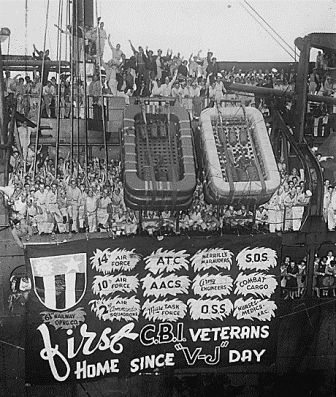 Veterans of China, Burma, and India are shown aboard the General Greeley, first ship from this Theater
to dock in New York. The picture was made as the ship was tied up.
ENLARGE IMAGE
Veterans of China, Burma, and India are shown aboard the General Greeley, first ship from this Theater
to dock in New York. The picture was made as the ship was tied up.
ENLARGE IMAGE
|
AROUND THE WORLD
DISPATCHED BY ATC
The second around-the-world weekly Air Transport Command plane was on its way back to Washington this week, following successful termination of the initial six-and-a-quarter day flight which passed over India from Karachi to Calcutta, thence over The Hump to China and the U.S.
The first plane, accompanied by representatives of the three major U.S. news services, covered 23,279 miles in 149 hours and 21 minutes. It averaged fractionally more than 200 miles per hour flying time and about 155 miles an hour elapsed time.
The trip was only broken once, at Guam, when engine trouble developed 300 miles out. The plane had to turn back and the passengers were transferred to another craft.
DOESN'T SEE CHINA
Frederick Othman, of United Press, wired the following impressions aboard the Globester over the South China Sea:
"I never did get to see China. At midnight we took off from the strong-smelling city of Calcutta and headed across the Himalaya Mountains, known over here as "The Hump." We didn't have to worry about the Japanese and so we were flying over the southern or lower end of the pile.
"We were at an altitude of 12,000 feet. Then - whoosh - the plane hit an air pocket and zoomed up to 14,500 feet in a matter of seconds. My head hurt and so did everyone else's. The flight clerk passed out oxygen masks. I sat there looking out at the rain, wondering what urged me to become a world traveler.
"Then the four tips of our propellors caught fire. A Hump veteran next to me commented, 'Very pretty,' He explained it was 'St. Elmo's fire' and assured me one doesn't often get to see it. Two hours later, at 4 a.m., we landed at Kunming, where it was as cold as the nose of a Chinese dog. I closed my eyes and when I woke up we were over what the flight clerk said was the China Sea. I couldn't tell, for we were hemmed in by fog.
GETS GOOD SERVICE
"One thing about the world-girdling business. You may do it in six days, but you don't see much of it. For example, I wanted to stop off at Karachi, India. I hadn't been in India 10 minutes, when so help me, I had a barefoot striker tote my baggage and shoo the flies away. There was another gent in a turban who went ahead and brushed my path with a broom so I wouldn't stub my toe. When I suggested I might like some coffee there were seven waiters. Two brought coffee, another cream and so on through the jelly and toast." (How many waiters again, Mr. Othman? Even at an ATC station seven is a lot.)
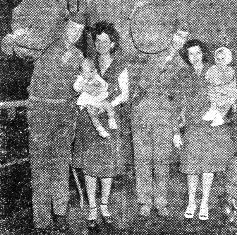 Returned to the States last week aboard the General Greeley from the India-Burma Theater were M/Sgt. William
Abel and S/Sgt. William Baker and their families. Both of the sergeants married while stationed in New Delhi.
SEE STORY (Roundup Oct. 4, 1945)
Returned to the States last week aboard the General Greeley from the India-Burma Theater were M/Sgt. William
Abel and S/Sgt. William Baker and their families. Both of the sergeants married while stationed in New Delhi.
SEE STORY (Roundup Oct. 4, 1945)
|
BOTH THEATERS SEND 28,910 TROOPS HOME
With the departure of the troopship General Brooke from Calcutta with 2,909 passengers, nine ships loaded with India-Burma and China Theater personnel had left Indian ports for the United States since Sept. 15.
Following is the box score for India-Burma and China Theater personnel departures:
Total combined strength of India-Burma and China Theaters as of Sept. 15: 227,391. Departed by water and air, Sept. 15 to Sept. 30: 16,768. Departed by water and air, Oct. 1 to Oct. 7: 12,142. Total personnel remaining in India-Burma and China Theaters as of Oct. 7: 198,481.
Departure figures listed above do not include hospital patients, prisoners and crews of planes returning to the United States.
LAST ISSUE OF YANK ON DECEMBER 28
WASHINGTON (ANS) - Yank, The Army Weekly, will stop publication with the December 28 issue, the War Department announced this week. "The honorable discharge of one of the Army's most colorful and successful activities has been in the cards since the successful termination of fighting on all fronts," the War Department said. It was stated that full title to the magazine's name will be retained by the War Department for future use. READ YANK
V-MAIL BAS HO GAYA; THEATER APO'S OPEN
V-Mail will be discontinued in this Theater after October 15, it was announced this week by Lt. Col. A. E. Adamson, Postal Officer. All APO's have been taken off the classified list and are now open. It is also urged by Postal authorities that personnel returning to other units immediately write to their correspondents and notify them of the change of address.
The Postal Officer also states that old letters cannot be sent back in packages. All letters, irrespective of age, must be sent first class.
Kunming, Chekiang Scenes Of Clashes
Generalissimo Chiang Kai-shek finished one short-lived civil war in Yunnan Province this week only to see the long-expected clash between the Nationalist Government and the Communists flare into open warfare as Kuomintang and Communist troops fought on the coastal plains of Chekiang Province and in Central China.
In Kunming, three American soldiers were wounded this week as Chiang Kai-shek's Central Government troops divested War Lord Lung Yun of the title of Governor of Yunnan Province and took over his private army after a three day "civil war," Army News Service reported.
Long recognized by the Chinese government as a focal point of internal dissension, the Yunnan capital flamed into open rebellion Oct. 3 after an announcement from Chungking that Lung Yun had been relieved of his office.
Fighting broke out between Lung's troops known to be the best-equipped, best-fed army in Southwest China, and a Central Government Division commanded by General Tu Li Ming shortly after communications between Kunming and Chungking had been cut.
STREET CLASHES
After a series of sharp street clashes, martial law was declared throughout the Kunming area. Personnel of the Tenth Air Force stationed outside the city reported they were awakened when fighting broke out early Wednesday morning by spent machine gun bullets penetrating their mosquito nets.
As fighting continued, American Army typists and clerks patrolled United States installations armed with rifles and tommy guns.
In the fighting, which ceased Friday, 40 Central Government troops were killed or wounded in addition to the three American casualties, none of whom were wounded seriously. Casualty figures among the Yunnan troops are not known.
Interviewed in the large hall of his Provincial Palace in downtown Kunming shortly after the cessation of hostilities, Lung told reporters, "I have always been loyal to the Generalissimo. I thought the firing was a revolt of the troops."
TROUBLE RECALLED
Lung pointedly avoided, however, answering questions about his reasons for never using his personal army in the war against the Japanese, even when Yunnan Province was threatened last year, or his ultimatum to the Generalissimo in August of this year in which he decided he would use his army in civil war against the Nationalist Government unless his demands for a "cut" in lend-lease equipment were met.
(During the threat of rebellion in Kunming in August - a threat which subsided momentarily when the Japs surrendered - American troops in the Yunnan capital walked the streets armed and guarded American installations.)
By week's end, all was quiet once more in Kunming, although an 8 p.m. curfew was still being enforced. Since his interview Friday, correspondents have been unable to contact Lung, and government officials would not say whether the onetime "Dragon of Yunnan" was under arrest or not.
CHEKIANG FIGHTING
Meanwhile, three days after United Press carried a Chungking dateline story declaring that "Chinese unity was seen nearer this week," fighting broke out in the eastern seaboard province of Chekiang between troops of the Central Government and Communist forces.
In Chungking Sunday, Communist sources asserted Chiang Kai-shek's armies had attacked Communist forces in Communist-controlled Central China and a major Central Government force, with support from the Japanese, was sweeping into areas under control of the Eighth Route Army, one of the best organized of Communist armies.
This reported major drive against the Communist armies came two days after the Yenan Communist Radio had broadcast a report that the East Chekiang Brigade of the new Fourth Army (Communist) had been attacked by the Kuomintang 70th and 79th divisions of the Central Government Third War Zone while withdrawing northward in Chekiang Province. This withdrawal, the Communist Radio asserted, was being carried out on the orders of Mao Tse Tung, China Communist leader, in an effort to "avoid a conflict with Kuomintang forces and to promote national peace and unity."
'NATIONWIDE DANGER'
"launching of such Kuomintang attacks
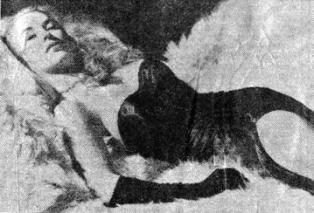 After sleeping on an Indian charpoy for all these long months, won't it be nice to get home and crawl into
a soft bed of fur? Lovely Warner Brothers star Andrea King, above, demonstrates what we mean. Looks nice, doesn't it?
After sleeping on an Indian charpoy for all these long months, won't it be nice to get home and crawl into
a soft bed of fur? Lovely Warner Brothers star Andrea King, above, demonstrates what we mean. Looks nice, doesn't it?
|
These clashes between National Government and Communist forces followed an announcement by the Chinese Government in Chungking that Kuomintang and Communist conferees - who have been discussing China's postwar problems during the past month - had agreed to establish an all-party political council to study further means of bringing about unity in war-torn China.
Although talks between the Kuomintang and Communists had booged down, chiefly because Chiang Kai-shek and Communist leader Mao apparently were unable to see eye to eye on several important matters, observers had considered the formation of the all-party council as indicating new hope for Chian's peace.
As total fraticidal war threatened the newly won peace of the war-weary Chinese, Southeast Asia Command this week announced that a cease-fire agreement had been reached in Indo-China between French authorities and leaders of the Indo-China independence movement which has been fighting the return of French rule. Street battling, which had been in progress for days, continued however, and thousands of armed Annamites, under Jap leaders, were reportedly massing outside Saigon.
Ledo EM Enlist In Regular Army
LEDO - In ceremonies at Advance Section here, 14 men, the first to be discharged to join the Regular Army, were sworn in today by Brig. Gen. Walter K. Wilson, Jr., Commanding General of Advance Section.
Within a week the men will be headed stateside for a three-month furlough before entering on their Regular Army enlistment. Prior to taking the oath, each was discharged so that he could re-enlist.
They took the oath as privates, but immediately were promoted to the rank which they previously held.
Temporarily attached to their original units, the enlistees will return to the States on furlough status which will assure them of fastest transport.
967TH ENGINEER MAINTENANCE G.I.'S
PERFORMING EXCELLENT REPAIR JOB
ALONG THE STILWELL ROAD - Like migratory defense workers, members of the 967th Engineer Maintenance Company arrived in Ledo, Assam in April 1944, with only their little tool kits. They were ahead of their shop truacks and equipment by two months, but no sooner had they made camp in a muddy area than they were put to work to try to remedy one of the biggest problems facing Engineers building the Ledo Road.
Nearly 60 percent of all bulldozers, graders, shovels, cranes, rock crushers, generators and other heavy equipment used on road construction was deadlined for lack of replacement parts, and the equipment was urgently needed. Capt. Richard L. Coad, Hutchinson, Kans., reported to Maj. Gen. lewis A. Pick in his most formal military style.
"We haven't time for formalities," said the General. "What we need is equipment in working order. I don't care how you do it. That's your worry. But start getting it done today."
next day a contact platoon was sent forward to serve engineer aviation battalions near the point of the Road, and a detachment was put to work clearing a jungle area for the shops and camp. Still no replacement parts were available, so an entire platoon began reclaiming needed parts from wrecked and salvaged equipment.
175 VITAL PARTS
During the first two months of operation, still working with only their hand tools, more than 175 vital parts were supplied to units working on the Road. Gears were shaped by hand, and internal parts for diesel motors, which supposedly must be manufactured in air conditioned shops, were made outdoors. In this period, more than 50 percent of all jobs turned out were made workable from parts either manufactured or reclaimed by the salvage detail.
When the company's equipment did arrive, they organized a heavy machine shop such as is but seldom seen in the States.
In their electrical shop truck they have been able to repair and recondition hundreds of magnetoes, small motors, and even have manufactured complicated electrical parts. Special tools are manufactured in a tool and bench shop truck. Light and heavy machine shop trucks are capable of turning out almost any conceivable part needed on a piece of heavy equipment.
On the spacious floors of their various shops, large milling machines, lathes, treading and track pin machines and jigs jabber all day, grinding out parts to repair anything repairable. In the welding and blacksmith shop you may see anything from a chain boomer to a two-yard shovel taking shape under the experienced hands of the workers.
PAID DIVIDENDS
The maintenance engineers early learned that the best way to keep heavy equipment in operation was to prevent wear and damage to it due to incorrect handling and servicing. Trained operators and mechanics were sent to work with operators in each battalion, instructing them in proper care and minor maintenance of their machines. Soon this training program began to pay big dividends. Fewer jobs of higher echelon repair came into the company's shops, and the number of operating hours between major repair jobs was considerably increased.
BUILD ANYTHING
When parts were not available in the Theater, as often they weren't, engineers made them. "We have men in this company who can build anything," said M/Sgt. Michael E. Jacobs, North Braddock, Pa. "In one six month period we completed 1,849 major job orders, and I don't mean drilling holes, welding angle irons or installing folding beds in jeeps. Our men built parts which few machine shops could have made. Their 'know how' helped speed the building of the Ledo Road as much as anything else."
The company has been called upon to do many things beyonf their regular duty. They have built special logging trailers, modified rock crushers, replaced dump truck bodies with special bodies they designed and built for pipeline engineers. Their shop-built equipment is in use by engineers along the full length of the Stilwell Road, and they have found time to do such odd jobs as building special braces for battle casualties and ice cream freezers for hospitals and other units.
Before the Stilwell Road was opened, all heavy equipment sent to forward areas had to be flown to its destination, and the engineers assumed the responsibility for dismantling most of this machinery for air shipment. When the airstrip at Myitkyina was retaken from the Japanese, an eight-man crew from their company dismantled four R-4 caterpillars and had them loaded on planes in 13 hours, which is still a record for the Theater.
UNDER FIRE
The men were usually sent with their equipment to reassemble it where it was landed. Some of these units were under fire at Myitkyina, and others were bombed at advanced bases.
one of the highlights of the company's colorful history occured when a detail was sent to Myitkyina to repair a German Bosch diesel locomotive damaged in the fighting for the town. They were able to put everything in order on the spot except the fuel injector which was damaged beyond repair. No such parts were available either in the Theater or in the States, so the engineers returned to their headquarters with the damaged parts, where they used their special equipment to build a new injector. The locomotive was repaired in time to be used in the famed Mogaung-Myitkyina railroad against the retreating Japs.
The 967th serves engineer units along the Road from Ledo to Kunming, making repairs in the field where special machinery is not needed. For their work in the forward areas they have earned a special commendation from Maj. Gen. Pick. But is hasn't been all work. In their off hours they have built one of the best camps in the entire area. Their day room and constant supply of hot water are the envy of other units.
CITED BY MAGAZINE
"We try to work like a large commercial shop in the States," says Capt. Coad. "We have regular hours, and after duty a man's time is his own. You can't do enough for men such as these. They have been cited by Maintenance Engineer magazine as the best in a highly skilled business, and I'd put them up against the best technical men in the factories which built the machines they keep running."
With completion of the Road, their duties were only slightly less demanding. Equipment still had to be kept in top condition to maintain the Road against the assault of the monsoon, and the maintenance men maintained their record of maintaining the equipment that maintains the Road.
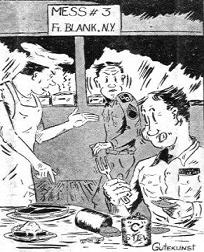
|
PEOPLE MORE FUN THAN ANYBODY
THEATER OF WAR: At Fort Belvoir, Va., Pvt. Robert Merrill was dishonorably discharged and sentenced to 10 years in prison on charges of desertion. Merrill however, pleaded that an error had been made and that he had been working in the Post Theater ever since he was listed AWOL last December. COLD JUSTICE: Sent out to bring in a woman on a morals charge, two Oklahoma City, Okla., policemen blushed but did their duty. The gal refused to put on her clothes, so the cops dragged her to the jail cell in the nude. She changed her mind after sitting on the jail's cold steel furniture. DREAM MEAL: Back from the war, wounded vet Sgt. Eddie Hughes of Monessen, Pa., promptly ate the meal he had dramed of for so long: a banana split made with 10 bananas, two quarts of ice cream, one quart of fruit salad, marshmallows, chocolate syrup, pineapple, nuts, cherries and whipped cream. Took him an hour and a half to eat it. CRIME EXPERTS: Charged with larceny, Ralph Moreau, a policeman in Dedham, Mass., explained to the court that another policeman had taught him nto pick locks with a pocket knife. EFFICIENT SERVICE: New York City taxi driver Hyman Rabinowitz was drinking in a sidearm joint when he saw someone driving off in his cab. He rushed to the sidewalk, waited a few minutes and the cab came back down the street. He hailed it; the driver-thief politely stopped. "Police
|
No 'Chicken' At Malir As G.I.'s Wait
For Shangri-La Bound Vessels
KARACHI - Biggest boomtown in the India-Burma Theater is at Malir, outside Karachi, where thousands of troops from over China, Burma, and India are coming by plane and train to be staged and processed prior to return home.
Located 18 miles from the heart of Karachi, Malir Replacement Depot is a huge sprawling military cantonment built by the British, but now utilized entirely by the American Army. It's a vast, flat area of desert land with scrubs and bushes and few trees. Hot winds blow across it during the day, but typical desert chillness prevails at night.
During the early stages of the war, the British built Malir as the last line of defense, in the event the german Afrika Corps succeeded in driving eastward for a juncture with approaching Jap armies. It was here that Gen. Montgomery trained his famous Eighth Army.
The camp is laid out in highly defensible perimeters and covers an immense area of 86 square miles. Barracks and fire walls are of heavy stone and cement, so arranged that an infiltrating enemy would be exposed to fire from all sides. As baffling as Malir might have proved to the enemy, it's equally puzzling to the thousands of G.I.'s quartered here as they wander in all directions to find PX's, Red Cross Clubs, Recreation Centers and similar places.
AIR BASE USE
It's no secret that sudden cessation of hostilities with Japan found the Army unprepared to house, process, and ship thousands of troops from the Indian west coast port of Karachi. Virtually closed as an embarkation and debarkation point several months ago, Karachi was maintained primarily as an air base from where relatively small numbers of men winged westward to Miami and New York. Calcutta remained as a sole point where ships were sailing for Shangri-La's shores.
When the war ended, it was obvious that Calcutta could not support the tremendous flow of troops homeward-bound and neither could the rail system to the Hooghly River harbor city. Therefore, an entirely new route and port had to be set up. It wasn't until Aug. 28, only a few days before troops were arriving, that the first officers and enlisted men were flown to Malir to form the nucleus of the rapidly-expanding depot. Most of the cadre had been rounded up hastily at Kanchrapara, outside Calcutta, where the men had been billeted after arriving from the States and awaiting assignment as replacements.
C.O. of the 2nd Evacuation Battalion at Malir, the outfit that handles men for water shipment, Maj. S. P. Marshall, had been overseas only two months and was bound for China as an Artillery officer, when he was ordered to Karachi to activate a unit for the housing, feeding and processing of incoming troops.
FROM MANY BRANCHES
Few of the officers and men had ever done such work before, Capt. D. E. Casey, executive officer of the battalion, was an Infantryman and previously knew the major only as a casual acquaintance aboard ship enroute to India. Lt. William G. Foster, Public Relations Officer, was given the job of planning a processing station and hastily evolved a production line set up that clears men in a jiffy. Other officers and men are from every imaginable branch of the service, from Armored Force to PX work, yet they accepted the new task with enthusiasm and pitched in to organize a speedy preparation center free of red tape and as comfortable as possible. From Sept. 5 to 15, 3,283 men arrived at Malir and hundreds almost daily since then.
Sergeant Major of the Second Battalion, M/Sgt. Henry P. Greco, formerly in the same capacity in a line company in the States, and overseas only three months, remarked that he had never seen men volunteer so freely in his entire Army experience. "They all want to get home, but quick - and I've never met guys so willing to work." Homeward-bound officers feel the same way and on one occasion a chicken colonel came to headquarters asking for an assignment as long as it would speed up getting back to the States.
LONG SERVICE
Some of the men in the Replacement Depot have had long overseas service in this Theater or in other places such as Panama or the Aleutians. Sgt. Richard G. Merchant, Motor Sergeant, has 17 months to his credit in Assam and Northern Burma with an ack-ack outfit. Pvt. Charles P. Kuder, a clerk in battalion headquarters, served two years in Panama and after a few months in the States was sent to India. The newly-arrived Second Battalion staff was given every assistance by the oldtimers in the area who had processed men for air shipment and staffed the camp previously.
When G.I.'s on their way home arrive at Malir, they are housed in comfortable stone barracks in various areas, each of which has wash room, shower and latrine facilities adjacent. Mess Halls and day Rooms are conviently located and in addition, ther are Red Cross Clubs, PX's and a swimming pool at the cantonment. At least one enlisted men's club has been opened and more are in preparation where G.I.'s can enjoy drinks. Movie areas are scattered throughout and dhobis patrol the barracks looking for work.
Men arriving as casuals are handled differently from those coming in as members of Category IV Units (units declared surplus and being returned to the States for deactivation and in which personnel will either be discharged or reassigned after receiving furlough.) Casuals are processed almost immediately upon arrival. They are taken to a station where a thorough check is made of clothing and equipment to discover shortages.
CLOTHING EXAMINED
Vets enter an area with barracks of duffle bags, make a simple form and are issued a PX card. From there they proceed to a platform where clothing is examined and a form checked to make sure the men have every item required. Shortages are issued much the same as they were upon induction, except that an effort is made to give the men the size they indicate. The G.I.'s operating the processing section are courteous and efficient and no brush-offs are given the returnees.
Outfits do their own processing through unit supply officers who check clothing and equipment and draw shortages in bulk for the entire organization and then distribute it individually to the men. Once processing is completed, men are free to visit recreation centers, enjoy bunk fatigue, move about the cantonment, ride bikes or spend their time as they see fit. The average G.I. coming to malir gets to Karachi at least once, if he desires, before he sails. Details are kept to a minimum, although the amount of work required id prodigious for the permament party and casuals are asked to help out in guard duty, as life guards at the swimming pool, doinf administrative work or KP, but the men are willing to pitch in to kill time and there are no hardships imposed.
FEW DAYS WAIT
As ships arrive, G.I.'s are alerted and made ready for the trip to the docks and their last glimpse of India. Everything is being done to keep the men only three or four days at Malir before embarking for home.
T/Sgt. Don L. Hanson, capable and efficient, has called out thousands of names of men returning home. Overseas 25 months himself, Hanson has been at the ports of Bombay, Calcutta and now Karachi and moving troops is an old story to him.
"The men are so anxious to go aboard they can hardly sound-off their first names and middle initials," Hanson related.
At the malir Replacement Depot, returning casuals are segregated to separation centers and they are placed aboard the ship in that order. All the men going to the Fort Dix Separation Center, for instance, are in one group and stay in the same section of the ship so that there is no confusion or delay upon arrival in the States.
Men in Category IV Units however, go aboard the ship as an organization and are not broken into separation and reception center groups until they reach American soil.
China Surplus Disposal Plan
CHUNGKING (USIS) - Negotiations are underway for sale to the Chinese government of United States surplus property in China, Brig. Gen. George Ormstead has announced, according to dispatches to the New York Times. Property is valued at 150 million dollars.
Most of the surplus will be available to the Chinese government although United States government agencies and non-profit organizations have first claim. Except the United Nations Relief and Rehabilitation Administration, which is embarking on an expanded program in China, these other demands are not expected to make a substantial dent in the amount available to the Chinese government.
The Chinese are especially interested in communications equipment. They want not only surplus in China but also the surplus in India and in Pacific areas.
HELP WANTED
Look fellas, the situation is getting desperate. The Roundup staff is crumbling around the edges. In another month or so, at least five of our point-heavy hacks will be heading for home. And we must have replacements. Whether officer or enlisted man, if you have had any newspaper experience, particularly re-write work, and if your point score precludes your going home soon, drop us a line. The address: Hqs., USF in IBT, APO 885. The Roundup needs you!
The Roundup is a weekly newspaper of the United States Forces, published by and for the men in Burma and India, from news and pictures supplied by staff members, soldier correspondents, Army News Service, and United Press. The Roundup is published Thursday of each week and is printed by The Statesman in New Delhi and Calcutta, India. Editorial matter should be sent directly to Major Floyd Walter, Hq., U.S.F., I.B.T., APO 885, New York, N.Y., and should arrive not later than Saturday in order to make that week's issue. Pictures must arrive by Friday and must be negatives or enlargements. Stories should contain full name and organization of sender. Complaints about circulation should be sent directly to Capt. Drexel Nixon, Base Section, APO 465, New York, N.Y. Units on the mailing list should make notification of any major change in personnel strength or any change of APO.

October 11, 1945
Original issue of Roundup shared by Virginia Dyer, widow of CBI veteran Stanley Dyer.
Copyright © 2006 Carl Warren Weidenburner
TOP OF PAGE PRINT THIS PAGE ABOUT THIS PAGE SEND COMMENTS
PREVIOUS ISSUE CLOSE THIS WINDOW NEXT ISSUE

